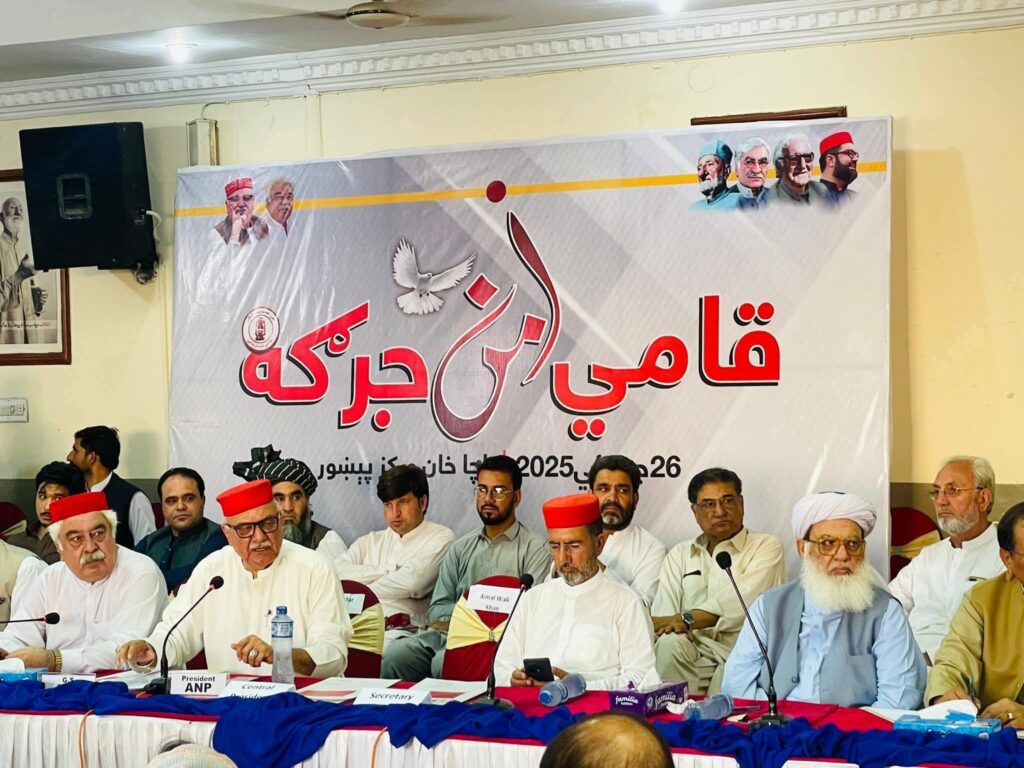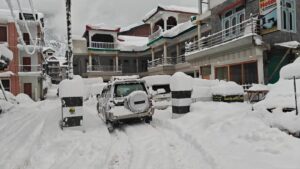PESHAWAR – Leaders from various political parties and tribal communities, under the banner of the Qaumi Aman Jirga (National Peace Jirga), have issued a 28-point declaration in response to the growing wave of insecurity and violence in Khyber Pakhtunkhwa and the merged tribal districts.
The jirga, led by Awami National Party’s (ANP) provincial president Mian Iftikhar Hussain, was convened to address what participants described as “an alarming return of unrest” to the region.
#قامي_امن_جرګه سے عوامی نیشنل پارٹی پختونخوا کے صدر میاں افتخار حسین کا خطاب#قامي_امن_جرګه #ANP #MianIftikharHussain pic.twitter.com/4EekZeWAKu
— Awami National Party (@ANPMarkaz) July 26, 2025
The jirga declared the slain ANP leader Maulana Khanzeb a national martyr and urged the federal government to form a judicial commission headed by a Supreme Court judge to investigate his killing. It also urged the need for immediate measures to restore public confidence in state institutions and their ability to maintain peace.
Participants called on national-level leadership of political parties in the province to form a delegation that would engage in dialogue with the military establishment regarding the security situation in KP and the former tribal areas. They stressed that the region cannot bear the burden of further instability or serve as a battleground for external conflicts.
ANP national jirga at Bacha Khan Markaz, Peshawar
— Rifatullah Orakzai رفعت اللہ اورکزئی (@RifatOrakzai) July 26, 2025
@ANPMarkaz @MianIftikharHus #ANP pic.twitter.com/8Key2aXXJg
The declaration included a plan to establish a cross-party committee comprising political leaders and elders to lead peaceful demonstrations in Islamabad or Rawalpindi. The jirga demanded full enforcement of the 18th Constitutional Amendment and the timely release of the National Finance Commission (NFC) award, calling both constitutional obligations.
Rejecting all forms of violence, the jirga urged the state to adopt a consistent policy towards all armed groups and to dismantle the infrastructure of militant and banned organisations without distinction. It reiterated the need to implement the National Action Plan in full and without delay.
One of the key concerns raised was the continued enforcement of the “Actions in Aid of Civil Power” regulation. The jirga demanded its repeal, calling it undemocratic. It also called for presenting all missing persons before civilian courts and recognising enforced disappearances as a criminal offence.
The jirga urged a shift of security and administrative authority to civilian institutions in the province, particularly in law enforcement, advocating that the police—not the military—should lead these efforts. Participants rejected the idea of renewed proxy conflicts in the region and highlighted concerns over the possible economic incentives tied to continued instability.
The jirga called on the state to prioritise reconstruction in conflict-affected areas and provide compensation and livelihood opportunities to those displaced or affected by past military operations. It noted that markets, homes, and public infrastructure across regions like Bajaur, Waziristan, and Chitral have sustained extensive damage over the years.
The statement further pointed out that despite several military operations, certain militant groups continue to re-organise, raising concerns over the effectiveness and sustainability of the current security strategy. It urged lawful action against private militias and called for constitutional protections for all citizens, particularly the Pashtun population.
In its foreign policy recommendations, the jirga stressed that Pakistan should remain neutral in global conflicts and focus on building peaceful and neighbourly relations with surrounding countries to promote regional stability and economic growth.
Other key demands included:
- Reopening of all trade routes with Afghanistan under provincial administration.
- Parliamentary oversight of all policy decisions and an end to unconstitutional interventions in politics.
- Release of federal dues to KP and fulfilment of commitments to the merged districts, including 100bn rupees, tax relief, and establishment of universities.
- Administrative and development control of tribal districts to be handed over to civilian authorities and elected representatives.
- Recruitment of 22,000 khasadars under pre-merger agreements.
- Increased educational facilities for women in areas with low literacy rates.
- Comprehensive reconstruction plans, resettlement efforts, and infrastructure rebuilding.
- Restoration of internet and mobile services.
- Reduction and rationalisation of military checkpoints.
- Digitisation of land records.
- Implementation of reserved seats in professional education institutions and restoration of higher education scholarships.
- Retention of KP’s primary role in the Frontier Constabulary.
- Full and uninterrupted implementation of the 18th Amendment to address structural grievances of smaller nationalities.
While the jirga’s demands represent a unified voice from a cross-section of political and civil society actors in the region, there was no official response from the federal government or the security establishment at the time of reporting. The jirga concluded by emphasising the need for long-term political dialogue and constitutional governance as the path to peace.












